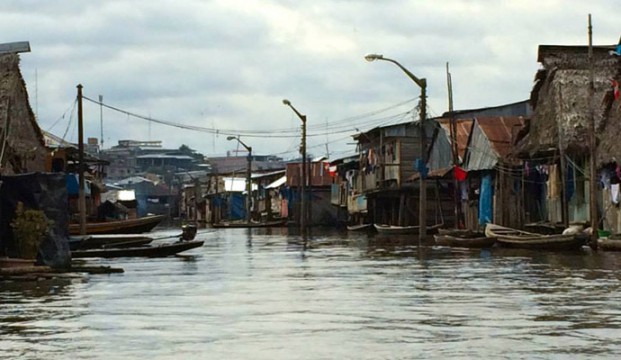Second-year Geisel School of Medicine student Adrianna Stanley is among 21 Fellows from 16 medical schools who received a Benjamin H. Kean Travel Fellowship in Tropical Medicine. The Fellowship, given by the American Society of Tropical Medicine and Hygiene, is dedicated to nurturing medical students interested in tropical medicine.
“As a young scholar full of drive to make a difference in tropical medicine, I was given the opportunity to return to my Latin American community to fight infectious diseases alongside those with whom I share a common heritage, and for this I am profoundly grateful,” Stanley says. “I was thrilled by the chance to embark upon my first true global research endeavor and to be on the front lines of cutting-edge tropical medicine research.”
Stanley spent the summer in Iquitos, a city in the heart of the Peruvian Amazon Basin, working alongside the US Navy and a Peruvian infectious disease research collaborative on a case-control study investigating the epidemiological risk factors for severe Plasmodium vivax malaria—the most common of the four malaria species in Latin America. Previously thought to be a more clinically benign form of malaria, vivax is now becoming a life-threatening illness in Peru where healthy patients are dying from kidney and liver failure, shock, and cerebral complications.

“It is such an honor for both Adrianna and Geisel that she was selected for the Kean Travel Fellowship, which is a very competitive,” says Lisa V. Adams, (MED ’90), an associate professor of medicine and associate dean for global health. “I am pleased the selection committee recognized Adrianna’s many talents and accomplishments—from her stellar academic record to her keen interest in infectious diseases to her longstanding commitment to improving health in Latin America.”
Stanley’s interest in tropical medicine stems from an early fascination with the evolutionary prowess of bacteria, viruses, fungi, and parasites, and by the intricate mechanisms they use to produce disease within the human body. But most of all, she says, she is continuously challenged and frustrated by their ability to persist in a world with so many advances in medicine and technology.
For Stanley, whose family is from San Jose, Costa Rica, tropical medicine is also about health equity—she’s committed to ensuring that those who are most underserved in the global community are no longer burdened by preventable disease and have access to quality health care. “Tropical medicine for me,” she says, “is the face of my mother who lives everyday with cysticercosis. It is the sound of my three-year-old Costa Rican cousin crying from the misery of dengue fever, and it is a place where patients with Chagas, Leishmaniasis, and Leprosy should no longer be judged because of their diagnosis.”
Through her work this summer, Stanley laid the scientific foundation she will need in order to effectively serve her Latin American community as a future infectious disease clinician. It also gave her insight into the political and social context of conducting academic research and the cultural nuances that exist in the world of scientific investigation.
She says the fellowship also showed her the importance of being a confident and visible woman in science, and the need for strong mentors to guide young scholars of the next academic generation.
“Dr. Adams, who suggested I apply for this fellowship, has been an absolutely phenomenal mentor,” Stanley says. “She is so supportive of all my aspirations, and she constantly encourages me to push further and never give up. I wouldn’t have had these amazing opportunities and experiences in my first two years of medical school without her support and guidance.”